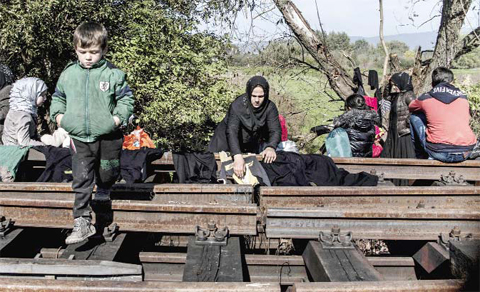 Migrants and refugees dry their clothes on railroad tracks after crossing the Macedonian-Serbian border. — AFP
Migrants and refugees dry their clothes on railroad tracks after crossing the Macedonian-Serbian border. — AFP
BRUSSELS: European Union and Balkan leaders hold emergency talks on Europe's refugee crisis yesterday amid threats from three frontline states to close their borders if northern EU countries stop accepting migrants. The mini summit, called by European Commission President Jean-Claude Juncker, groups the heads of 10 EU nations, including German Chancellor Angela Merkel, plus the leaders of Albania, Serbia and Macedonia.
The meeting comes after Bulgaria, Romania and Serbia on Saturday warned they would not allow themselves to become a "buffer zone" for the tens of thousands of arrivals streaming into Europe. "All three countries... are ready if Germany and Austria and other countries close their borders (...), we will be ready to also close our borders at that very same moment," Bulgarian Prime Minister Boyko Borisov said after talks between the three Balkan leaders in Sofia.
Over past months, non-EU member Serbia has been swamped by migrants on their way from Greece and Macedonia to northern Europe, though Bulgaria and Romania have been much less affected. Juncker's office said yesterday's mini summit was needed to foster greater cooperation "in view of the unfolding emergency". In an interview published yesterday by the German newspaper Bild, Juncker urged countries to stop handing on migrants to neighboring states in chaotic conditions. States "must take care to uphold orderly procedures and conditions," he said.
"The European Commission expects everyone to obey the rules of the game if we don't want to put Schengen at risk," Juncker said, referring to the EU's border-free zone. The EU is facing record arrivals with more than 47,500 people in the last week entering Slovenia, which has a population of just two million, and 48,000 entering Greece, which has a population of 11 million, according to official figures. With winter looming, Amnesty International on Saturday warned of a humanitarian disaster if migrants are stranded at borders.
"Every day counts," Juncker told Bild. Without action, "we will soon witness families dying wretchedly in chilly rivers in the Balkans." Slovenia is seeking help after becoming the main entry point into the Schengen zone when Hungary sealed its southern borders with coils of razor wire. Slovenia has asked Brussels for 140 million Euros ($155 million), in addition to police backup and logistical support. It says that if no help emerges, it may have to build its own border barrier with Croatia.
Human flow
An unprecedented 670,000 people mainly fleeing conflict in Syria, Iraq and Afghanistan have flooded into Europe so far this year, in the biggest movement of its kind since World War II. Most are travelling through Turkey, Greece and the western Balkans, seeking new lives in Germany and other northern EU states, creating a huge strain on those countries.
"The only goal of this long journey is to flee the disgusting war so we can start a safe life," Shaker Abara, 37, from the Syrian town of Homs, told AFP at the Berkasovo border area as he was waiting to cross from Serbia into Croatia in chilly temperatures early yesterday. More than 4,000 people arrived there overnight in less than 12 hours, police said.
Since last week's backlogs when thousands of refugees spent nights in the open air defying heavy rain and freezing temperatures, the situation has improved as the authorities of the two countries agreed to speed up the flow. "The most difficult was when we left Turkey on a rubber boat. There were 38 people onboard, including a lot of women and children. Luckily we safely arrived to Greece. Now we are in Europe and we already feel safe somehow," Abara said.
The 10 leaders from the 28-nation European Union who are invited to the mini summit are those from Austria, Bulgaria, Croatia, Germany, Greece, Hungary, The Netherlands, Romania, Slovenia and Sweden. But the meeting has once again highlighted a split in the EU over how to handle the crisis.
A division is emerging between those that see the crisis mainly as a border security issue and those that see it above all as a humanitarian integration challenge with the need to redistribute refugees among the EU. The Balkans summit will concentrate on immediate operational problems of how to deal with the human tide. That means it is likely to focus on the relocation option, favored by Germany and Sweden, an EU official said.
But some countries fear this approach will take the focus away from frontier control, which EU leaders agreed needed to be central to their efforts in a statement after a full summit of all 28 EU members on October 15. European Council President Donald Tusk warned last week that Europe had "lost the capacity to defend our borders." - AFP
.jpg)



